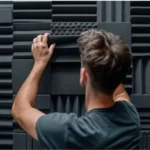- Mon - Sat 8:00 - 6:30, Sunday - CLOSED
- support@soundproofhub.com
Keep Noise out of Your Home Office with Soundproofing Guide

Keep Noise out of Your Home Office with Soundproofing Guide
Working from home is a growing trend, but household noise can often get in the way. Creating a comfortable and quiet environment is essential for increasing efficiency and focus. This guide provides you with all the steps and tips for soundproofing your home office.
The importance of soundproofing
Why is it important?
To focus: Reducing noise allows you to focus more on your work.
For professional calls: Soundproofing improves the quality of video calls and meetings by eliminating noise.
Calm environment: A quiet office improves mental peace and work performance.
Common noise sources
- Children’s noise
- Outdoor traffic
- Conversations with other household members
- Appliances such as fans, air conditioners, or machinery
Soundproofing principles
1. Block out noise
Use strong and effective materials to eliminate noise.
2. Reduce Resonance
Acoustic treatments to eliminate noise echoes within the office.
3. Choose the right materials
Use materials suitable for soundproofing, such as office acoustic panels and acoustic foam.
Steps for soundproofing a home office
1. Improve the walls
To block noise through the walls:
Panels: Use soundproofing walls in the office with panels.
Acoustical foam: Apply foam to the wall to reduce resonance.
Double-layer: Double-layering the walls reduces the travel of sound.
2. Soundproof the windows
How can you soundproof your windows?
- Install thick curtains or blinds.
- Use extra glass in the windows.
- Install noise-reducing seals.
3. Pay attention to the floor
To reduce noise through the floor:
- Use carpet or thick rugs.
- Install acoustical foam under the floor.
4. Strengthen the ceiling
- Install acoustical ceiling panels to reduce noise.
- Use baffles or drop ceilings.
5. Soundproof doors
- Use thick doors or acoustic doors.
- Install noise-reducing strips.
6. Use furniture
- Thick cabinets and bookshelves help absorb noise.
- Use acoustic furniture such as partitions.
Types of soundproofing materials
- Acoustic panels
Used on walls and ceilings.
Excellent for absorbing noise and reducing echo.
- Acoustic foam
Simple and effective solution.
Absorbs small noises.
- Thick curtains
Reduce both light and noise.
- Rugs and carpets
Easy solution for reducing noise on the floor.
Benefits of soundproofing
- Professional work environment
Reducing noise makes you feel like you are working in a professional setting.
- Increased work efficiency
A calm environment allows you to focus better.
- Peace of mind
Reducing noise reduces stress.
- Personal privacy
Your conversations don’t leak out, and outside noise doesn’t get in.
Special soundproofing solutions for the home office
- Office with acoustic panels
These panels are specifically designed for home offices.
They are easy to install and effective.
- Acoustic booth
An office acoustic booth provides a designated space where you can work free from noise.
- Open office acoustic solutions
If your office is in an open space, use partitions and baffles.
Common soundproofing questions (FAQs)
- How do you soundproof?
By using reinforced materials and acoustic foam.
By reinforcing windows and doors.
- Can I soundproof my home?
Yes, with the right materials and techniques, it is possible.
- Can you soundproof a room?
Not completely, but noise can be reduced considerably.
- How do you soundproof your home from outside noise?
By reinforcing the walls, windows, and ceiling.
- How to soundproof an office space?
Use acoustic panels and thick carpeting.
- How can you soundproof your windows?
- By installing extra glass and thick curtains.
- Practical tips for soundproofing
- Focus on the noisiest areas.
- Keep your budget in mind when choosing materials.
- Get professional help if the project is large.
- Regular monitoring is conducted to ensure the materials remain effective.
Conclusion
Soundproofing your home office is an investment that will improve your efficiency and peace of mind. Whether you use acoustic panels or reinforce windows and doors, each step will help reduce noise. This guide to soundproofing provides a complete solution.
Now it’s your turn: Make your home office quiet and productive!




Muhammad Zeeshan
Muhammad Zeeshan is an SEO expert and content writer, specializing in link building (SaaS, Tech, Business, and Home Improvements). I am very passionate about search engine optimization, backlink building, and guest blogging. I can help you in attracting a new audience and in achieving a higher rating.